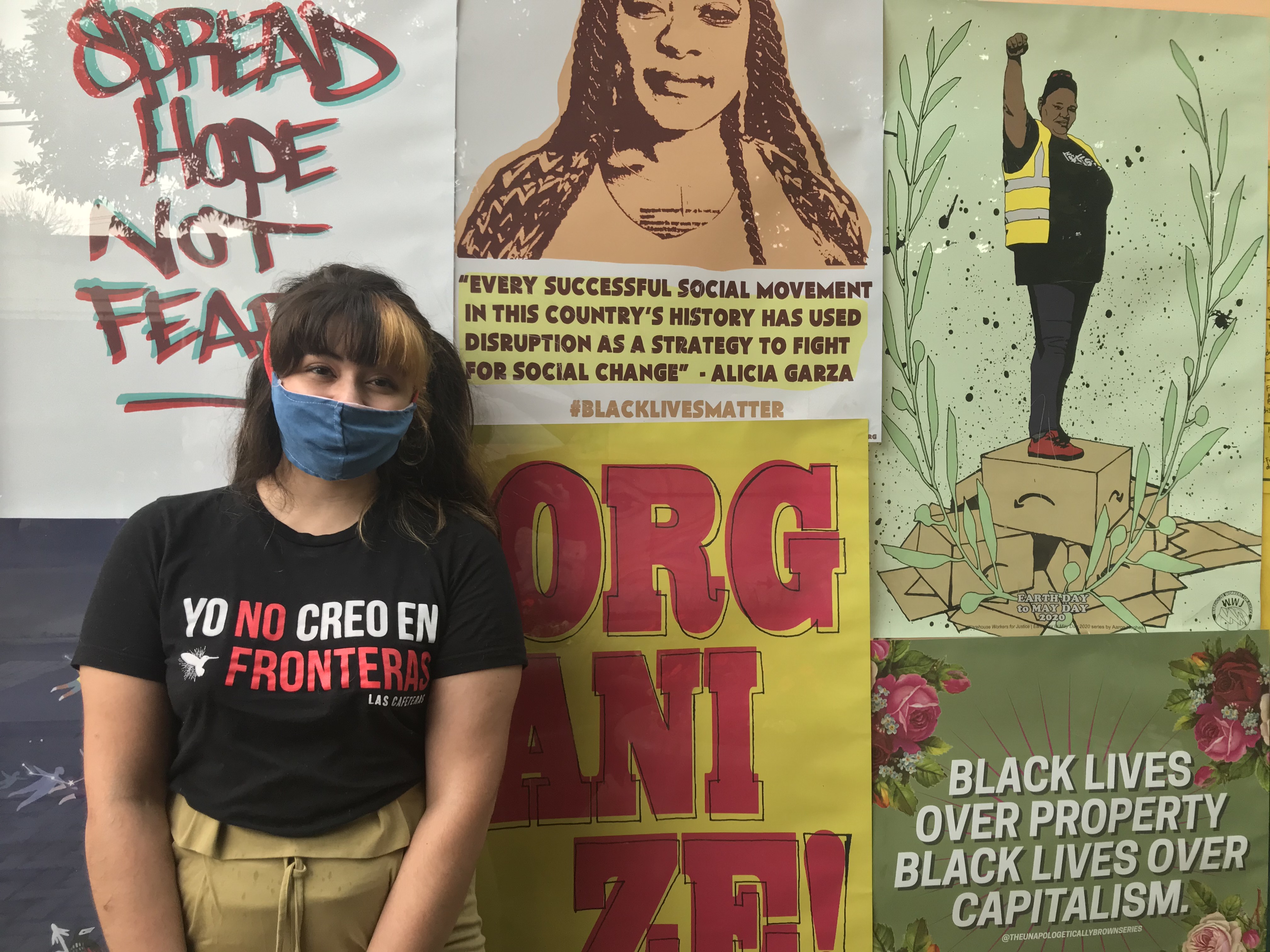 Laura Aranda, Steans Center Community Service Scholars Program Coordinator in front of public art by PO Box Collective
Laura Aranda, Steans Center Community Service Scholars Program Coordinator in front of public art by PO Box Collective
Spring Quarter 2020 was like no other in the two-decade history of the Steans Center. Practically overnight, Center staff were faced with addressing the question of how the university can take action to engage communities
while educating students remotely.
In the weeks since COVID-19 changed daily life, the Steans Center, Egan Office and the affiliated Asset-based Community Development (ABCD) Institute responded
by adapting and developing new approaches to community engagement, both inside and outside DePaul. In doing so, staff transformed service learning pedagogy, support of Community Service Scholars, coordination of
internships and community-based employment, and the delivery of trainings in community engagement.
“Staff were extremely creative in coming together to
create new ways for delivering remote community engagement opportunities for students while
maintaining connections to DePaul community partners” says Howard Rosing, Executive
Director of the Steans Center. “This year more than ever we need to celebrate
the talents and skills of our community engagement staff, as they quickly reorganized
in response to the pandemic in support of students, faculty and community partners.
In the span of a couple of weeks, DePaul switched to remote teaching, learning and administrative support. Community engagement was characterized more by Zoom meetings rather than direct face-to-face experiences, as DePaul
partners struggled to stay open to respond to increasingly urgent challenges
faced by the people they serve.
We’re fortunate to be at a mission-centered place where people care
about doing it right.
In a typical year, the Steans Center supports about 4000
students in community engagement activities. During Spring 2020, the
Center focused on supporting students and faculty in developing new ways to
further DePaul's Vincentian mission through courses, internships and scholarships. “There are as many ways
of approaching the challenge of service learning in these circumstances as
there are people,” says Helen Damon-Moore, Associate Director for Community Engagement Leadership at the Steans
Center. ‘We’re fortunate to be at a mission-centered place where people care
about doing it right.”
Support for Community-Engaged Courses
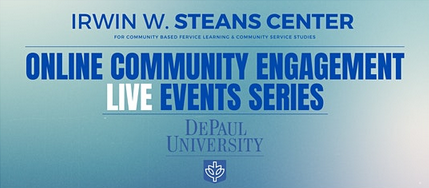
In March 2020, it became apparent that service learning at DePaul
would mean something very different in the age of COVID-19. “The vast majority
of connections we rely on have not been feasible, since students can’t be in
the community in the same way and we can’t meet face-to-face with community
partners,” says Ruben Alvarez Silva, who has an undergraduate and graduate degree from DePaul and is the Associate Director for Academic Service
Learning at the Steans Center. “We had to offer students a way to get content
and pair that with actions they could take remotely.”
In about a week’s time, Alvarez Silva says, the Center’s
academic service learning team built out 13 online modules and developed weekly
events on key issues including immigration, food and housing security, and mental
health, among other topics. Online Community Engagement (OCE) modules were designed with community-based
service learning students in mind, and featured self-directed learning and
videos. One component of the modules is a once-a-week online event that
encourages dialogue on selected topics. In addition, students had the
opportunity to follow up on these events and engage in a reflective online
space once a week with Center graduate service learning coordinators. Alvarez Silva stressed what he calls maintaining “the feedback loop of
service learning” that connects students, faculty, and community partners.
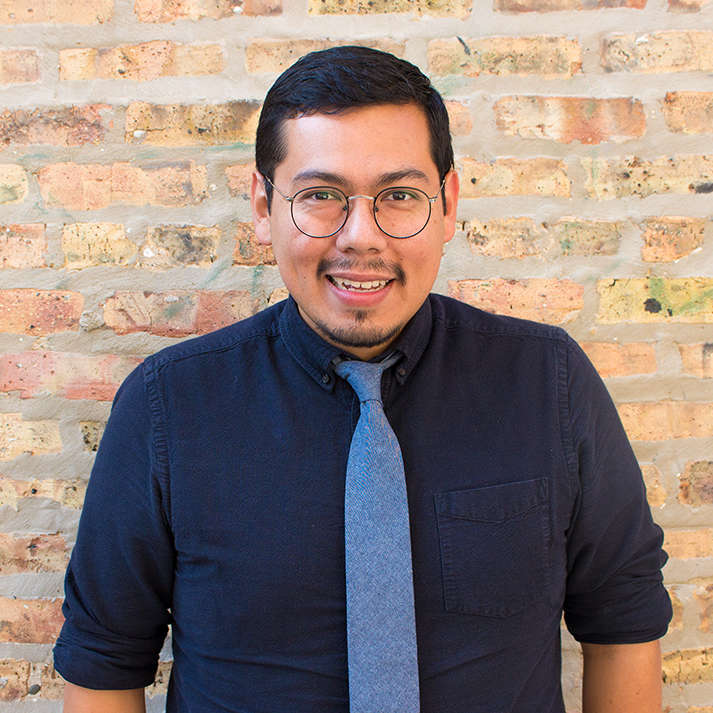 David Pintor
David PintorDavid Pintor works with Alvarez Silva on the Academic Service Learning (ASL) Team as
Student Engagement Program Manager. “The spring quarter started about a week
after the quarantine,” he says. “So we really had very little time to create
these modules. However, we’ve realized that we can use them well beyond the
quarantine. These virtual workshops can remain relevant because they reach so
many students, and we are also able to record and archive them.” One example,
he says, is a module on homelessness. “There is a list of things students can
watch or listen to – video clips, movies, podcasts. They can also read articles, reports and studies. It gives students another tool for
experiential learning.”
In addition to OCE modules, some faculty chose to pursue remote service learning projects with community partners. One example involved former Steans
Center Community Service Scholar and DePaul alum Drew Edwards ('13) who
conceived of a
nonprofit organization while studying at DePaul. Since then, Edwards
turned his concept into Pangea
Educational Development Group (PEDG). During Spring term, PEDG engaged DePaul
students in a project that assisted youth in
processing their experience during
COVID-19. Edwards connected with his former DePaul professor Melinda
Wright in the
School of Public Service who now sits on the board of PEDG. Together they integrated the project into Wright's Introduction to Nonprofit Management course. The project supported publishing of a book, The Unwelcome Stranger, to assist parents with explaining COVID-19. The book, which is also in audio, includes project-based learning activities that parents can complete with children while schools are closed.
 Jonathan Handrup
Jonathan HandrupJonathan Handrup, a Program Coordinator on the ASL team with two DePaul masters (MS '15, MSW'20), works to pair academic courses with community
organizations to enhance course and student learning. His job includes
working with DePaul’s graduate nursing students and faculty. “Every quarter, I know that this program
admits about 50 students who are looking for placements with organizations that
are relevant in terms of community health. This year, because of COVID, our
challenge was to see if we could locate enough partners to sustain the graduate
nursing cohort. And we did!” Handrup said it happened because of an online Zoom
placement fair in which organizations pitched what they do to students who were
looking for a placement. “This fair saved everyone a whole day – and gave
students an opportunity to have a conversation with organizations they could be
placed in for two years.”
Kaliah Liggons (MPA '18), Community Development Program Manager on the ASL team, reflects on how Steans
responded to the current challenge. “We were very conscious of the current
climate and knew there would not be direct interaction between students and partners,”
she says. “We only had a week in between winter and spring quarter – there was
little time to transition. This time there was no blueprint – but we found a
way to engage with community partners. We really learned how to be adaptable.”
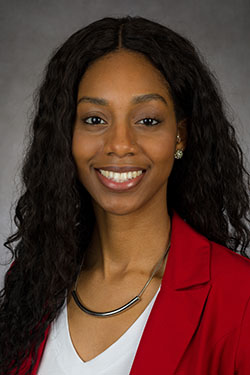 Kaliah Liggons
Kaliah LiggonsLiggons typically works with 8 to 11 DePaul courses
per quarter, each having 25 to 30 students that she connects with
three to six community partners.
She typically meets with representatives of community partner sites to
explore
opportunities for how service learning students will support them. “In this case, we
could not
do that in the same way,” she says. “We had to find other options.”
Online community engagement on specific topics along with opportunities for
project-based service learning, she says, proved to be valuable tools for reaching community partners while providing a mission-oriented faculty resource for
educating students
"The creativity of the staff during this time was unprecedented," Rosing says. "They truly stepped up and found ways to meet the challenges of communities, faculty and students." Rosing himself taught GEO 351 Geography, Food and Justice, which typically engages students in activist learning with food justice campaigns. During this Spring, students in the course campaigned to promote sick leave
for restaurant and food service workers, advocated for farmworkers risking their lives to harvest food,
and researched ways to assist small Chicago food businesses and nonprofits impacted by the pandemic. "I really watched as students took the lead and pushed through a difficult term while still practicing the mission," Rosing says.
Supporting Student Leadership
Promoting student leadership is the central focus of Community Engagement Leadership (CEL), a team of staff that support internships and scholarships. For example, the Community Service Scholars program typically supports 70-80 students working 30 hours per quarter with community partners across Chicago. Their work was quickly disrupted by COVID-19 says Laura Aranda, Community Service Scholars Program Coordinator. She notes “students didn’t know
whether they will be on campus in the fall, or what the world will look like. We work
with students as they try to navigate
next steps.” For some Community Service Scholars, Aranda explained, service
continued just shifted to remote activities. One student, Aranda describes, served as an online
volunteer teacher at a community mosque where she created curriculum
and activities for kids. Another did data entry for a
volunteer group of doulas. During Spring term, CEL held weekly reflection sessions giving scholars the
opportunity to share their service experiences with other students and discuss ways of
coping in general.
We work
with students as they try to navigate
next steps.
“We just wanted to be able to give students time and space
to talk to each other and see that they aren’t alone,” adds Angelica Chestleigh (MA, '16) Assistant Director for Internships and Scholarships in CEL. In addition to overseeing the Community Service Scholarship program with Aranda, Chestleigh develops opportunities for student leadership through the Community Partners Internship, the McCormick Community Internship, and a variety of other internship and scholarship programs. Similarly to service learning, Chestleigh explains how she and her students adapted. One intern, for example, worked with Telpochcalli Education Project, a longtime Steans Center partner, to create
a spreadsheet that the organization’s volunteers could use when dropping off
baby formula, food, and other supplies to neighborhood residents.
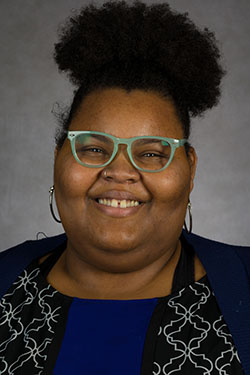 Angelica Chestleigh
Angelica ChestleighChestleigh adds, “a lot of the nonprofits we
worked with were overwhelmed with needs from their communities, and everyone is
under stress now. At the same time, we
always remember that when we work with communities, we focus on mutually
beneficial relationships. I keep reminding myself that ‘It’s Okay,' we will
eventually get through this and it’s okay to lean on other people." Furthermore, she acknowledges, "we definitely can continue this work and learn from what
we’ve done. That’s the silver lining – we’ve become more engaged
with students.”
Meanwhile, with guidance from Associate Director Helen Damon-Moore, CEL and other Center staff spent Spring rethinking the Center's longstanding annual Service Speaks Conference that highlights the work of students,
community partners, and faculty in their efforts to advance DePaul's mission. This year, Damon-Moore explains, Service Speaks will feature an online collection of
student community engagement presentations that highlight student leadership in community engagement through stories of both challenges and successes.
More Intentional Community Partnerships
Creating leadership opportunities for DePaul students is central to the work of the Egan Office for Urban Education and Community Partnerships. Egan Office Director, John Zeigler, reflects on how the Center responded to COVID-19. “There’s a resiliency and an acceptance to adapting to this
new norm,” he says. “That’s what’s emerging now.”
To further explain, Zeigler shared a unique example of a partnership with the Stein Learning Garden at St. Sabina
in the Auburn Gresham neighborhood of Chicago. “We are involved in
getting sunflower seeds to parents that they can plant in front their
homes. It’s symbolic of new life and connectivity and the spirit. Our
larger idea is that we are thinking about
different cultures in communities, and working with parents and school
principals on
how to bring in service learning.” Other Egan school projects engaged
DePaul graduate and undergraduate students in neighborhood
asset-mapping and retooling a manual for working virtually with schools and parents.
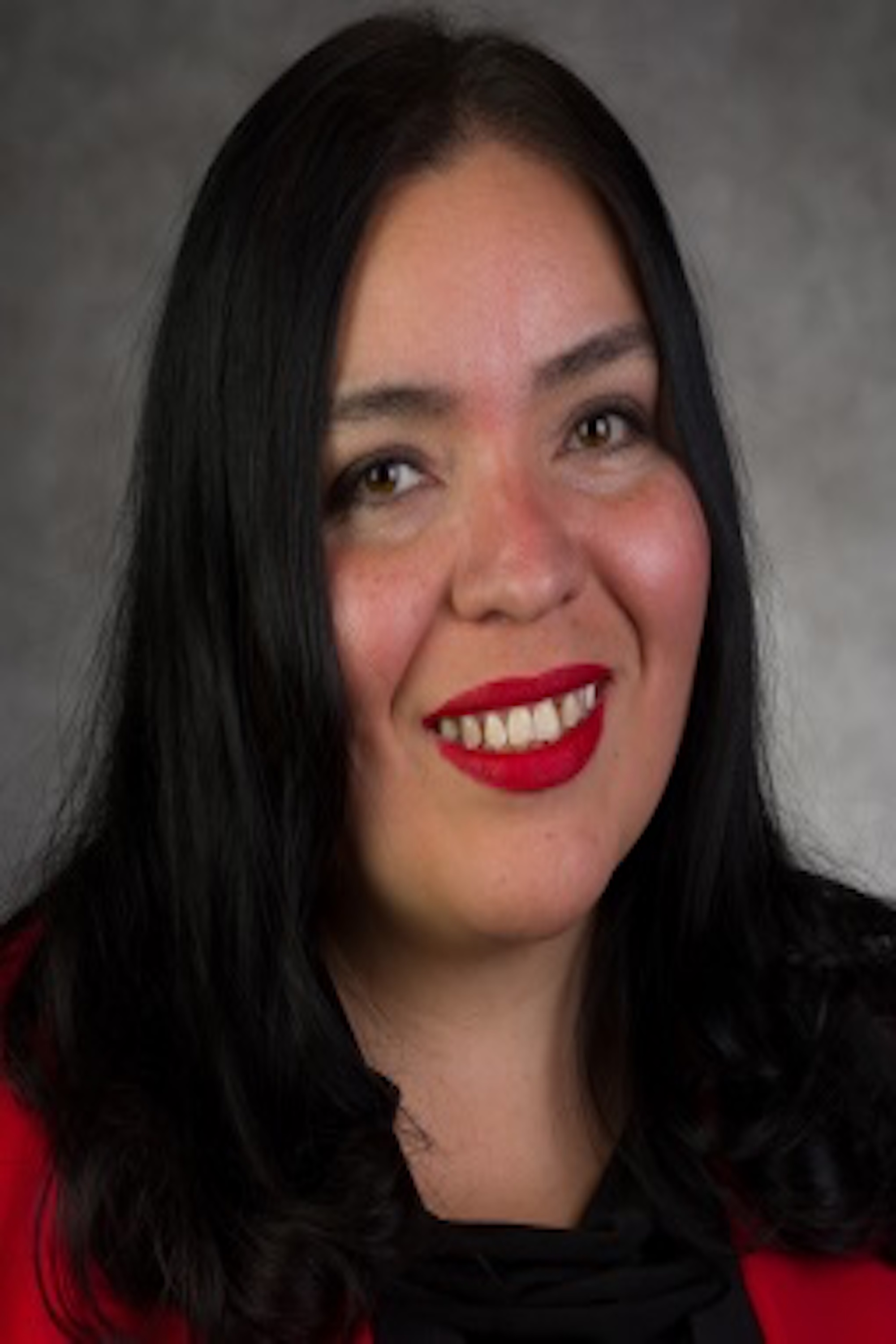 Dr. Monica Ramos
Dr. Monica RamosDr. Monica Ramos, Assistant Director at the Egan Office, oversees school internship programs in public and Catholic schools. She reinforces the importance of community
strengths as a pillar of the Center’s work – before and since COVID-19. Ramos works with DePaul graduate students who serve as community organizers,
bringing resources to schools, and undergraduates, who work as tutors and learn how to collaborate to build resources to improve upon the existing work of schools and parents.
“We come from the mindset of assets – our graduate students
identify the assets in the community and connect those assets to schools," says Ramos. “Meanwhile, principals have been accessible, open and flexible –
and they definitely see us as an asset to the continuous learning of the kids
and engagement with families.” Ramos says that the team at the Egan Office, along with several professors, came
together during the pandemic to “learn about topics and dig a little deeper. We
had a conversation about gentrification and how it’s even happening during
COVID-19. We asked how communities can be informed about grant relief, about
their rights, how people can pay for their rent, the well-being of kids, and
other issues.”
We are trying to figure out ways to be creative, while
also understanding that these schools and communities are dealing with a crisis
as well.
Additionally, Egan Office students put together a packet of
e-learning resources for families and caregivers as well as information about
COVID-19 in different languages. Sol Logsdon, Program Coordinator for Egan's Schools Team suggests that changes happening now in the school partnership programs can have
a positive impact down the road. “I think schools will be more open to
e-learning,” she says. “We are trying to figure out ways to be creative, while
also understanding that these schools and communities are dealing with a crisis
as well.” She says, “we continue to meet online with our tutors. And our tutors have been in touch with teachers in the schools, helping
with e-learning. Some of our students have also created materials for students
and parents.”
Creating resources for schools has always been the goal of tutors from the Egan Office's early education partnerships division, funded by JumpStart Inc since 2004. DePaul JumpStart Corps members make personal connections to children and
teachers at preschools. Students are trained in
JumpStart's curriculum and spend 300 hours a year in the
program. About 40 students in seven teams typically go to
five preschool centers around the city. That changed with COVID-19.
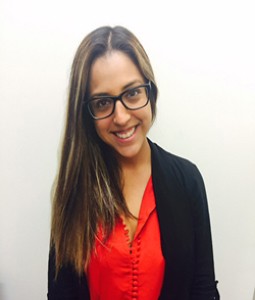 Jeanette Estrada
Jeanette Estrada“Teachers asked if we could make a video just to say hi to
the children,” says Jeanette Estrada, DePaul Site Manager for the JumpStart Program who began in the program as a DePaul student. “One student also made an online video tutorial for teachers who were
getting acclimated to online learning. We also reached out to teachers and gave
them concrete ways we could help them with reading and literacy." The key, Estrada says, was for students and the program to
be proactive, flexible, creative, and maintain personal relations with teachers
and schools.
Supporting Those Who Served
Creativity and proactivity are implicit in the Egan Office's innovative approach to community engagement. This approach, the Egan Way, is exemplified by Egan's Multi-Faith Veterans Initiative (MVI). Funded by the Robert R. McCormick Foundation since 2014, MVI has worked
citywide and now in nearby Waukegan to integrate mental and behavioral health with faith
institutions, linking veterans and families to local services and
resources in their communities. The community-based program has grown to
include nine sites in 18 communities.
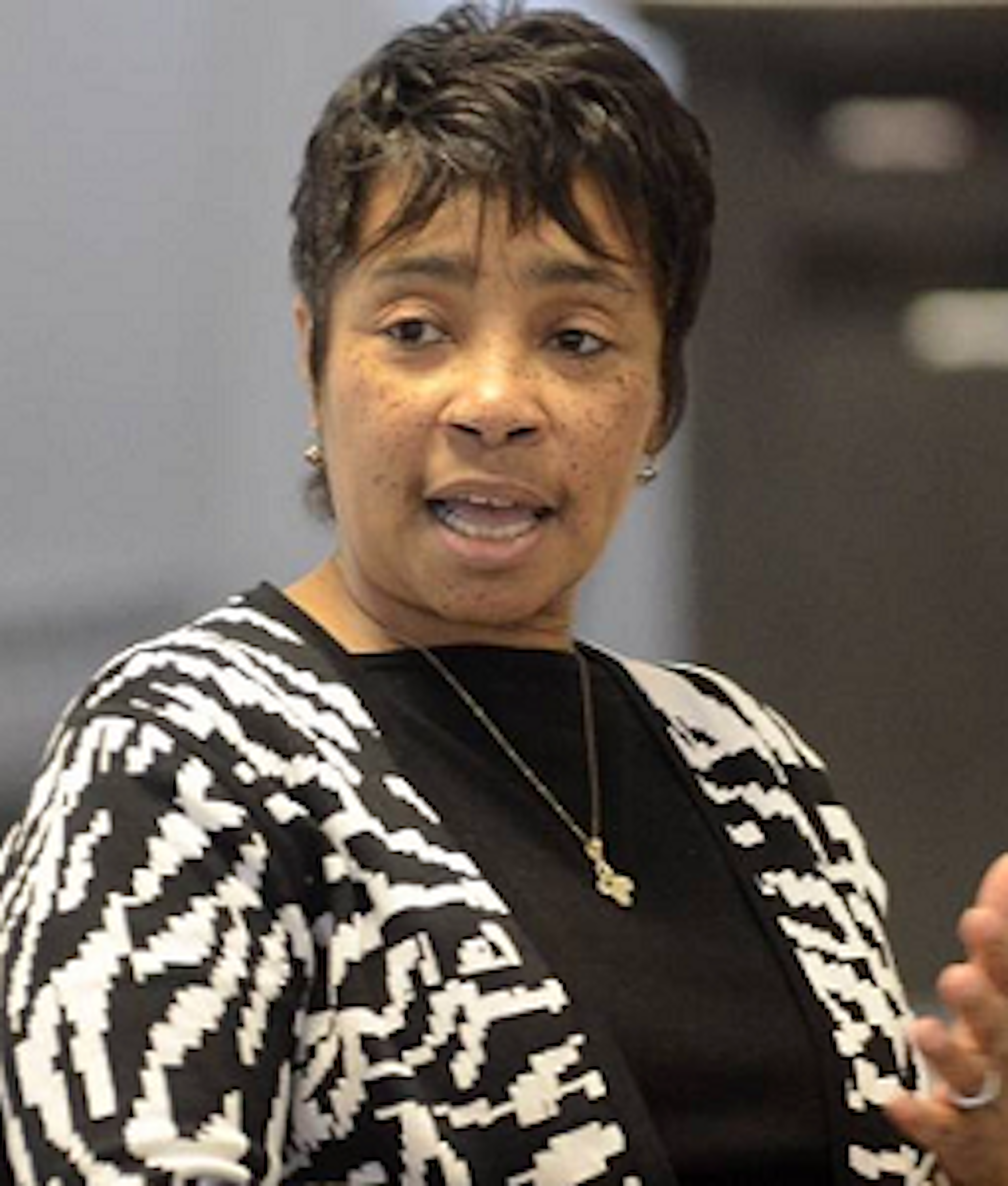 Walidah Bennett
Walidah BennettWalidah Bennett, MVI founder and Director, explains how they immediately pivoted to bi-weekly
Zoom conference calls where partners in the veteran services community talked about what they see on the
ground, how they are engaging with veterans and families, and their primary challenges. “Early on, we found out that partners didn’t have enough masks
and gloves,” Bennett says. “We asked, ‘How can we connect partners with other
wraparound or rapid response services that source some of the equipment they
need?”
A primary goal of MVI is to provide partners within the veteran community with
information about resources. To this end, in the midst of the pandemic, Bennett launched a Women’s
Project, starting with a series of Zoom meetings focusing
on the rising population of female veterans. “We decided to figure out what’s
going on with female vets – and bring together service providers, policymakers,
and others to hear about housing, employment, health care and other issues
affecting this group. We’re trying to understand what are the differences
between male and female transition issues. We know that a lot of it is related
to military sexual trauma.”
We are asking, ‘How
can the university be more intentional as partners than before?'
Finding ways to connect community partners to resources, knowledge, and ultimately power is central to the work of Egan Office, named in honor of the late priest and activist Monsignor John "Jack" Egan. To this end, at the outset of the pandemic, Zeigler co-hosted a global conversation in collaboration with the Goldin Institute,
a Chicago-based organization that connects grassroots leaders globally. Zeigler, Rosing and other staff sensed the need to quickly highlight exemplary models of community organizing in response to COVID-19. In turn, they organized an international conversation between organizers in the Rogers Park neighborhood of Chicago and a Bedouin community in the Negev. Then, along with Ramos, they hosted another conversation with a renowned scholar of health in Mexico. “It was
powerful,” Zeigler says. “The content was not so much looking at what’s wrong, but
what is working – what are the blessings and gifts in what we do on a local
level. And how do you ‘glocalize’ these conversations?" Zeigler says that the question keeps coming up
about how people at the Steans Center and Egan Office are responding to COVID-19. “We are asking, ‘How
can the university be more intentional as partners than before?’
Tracking Community Engagement
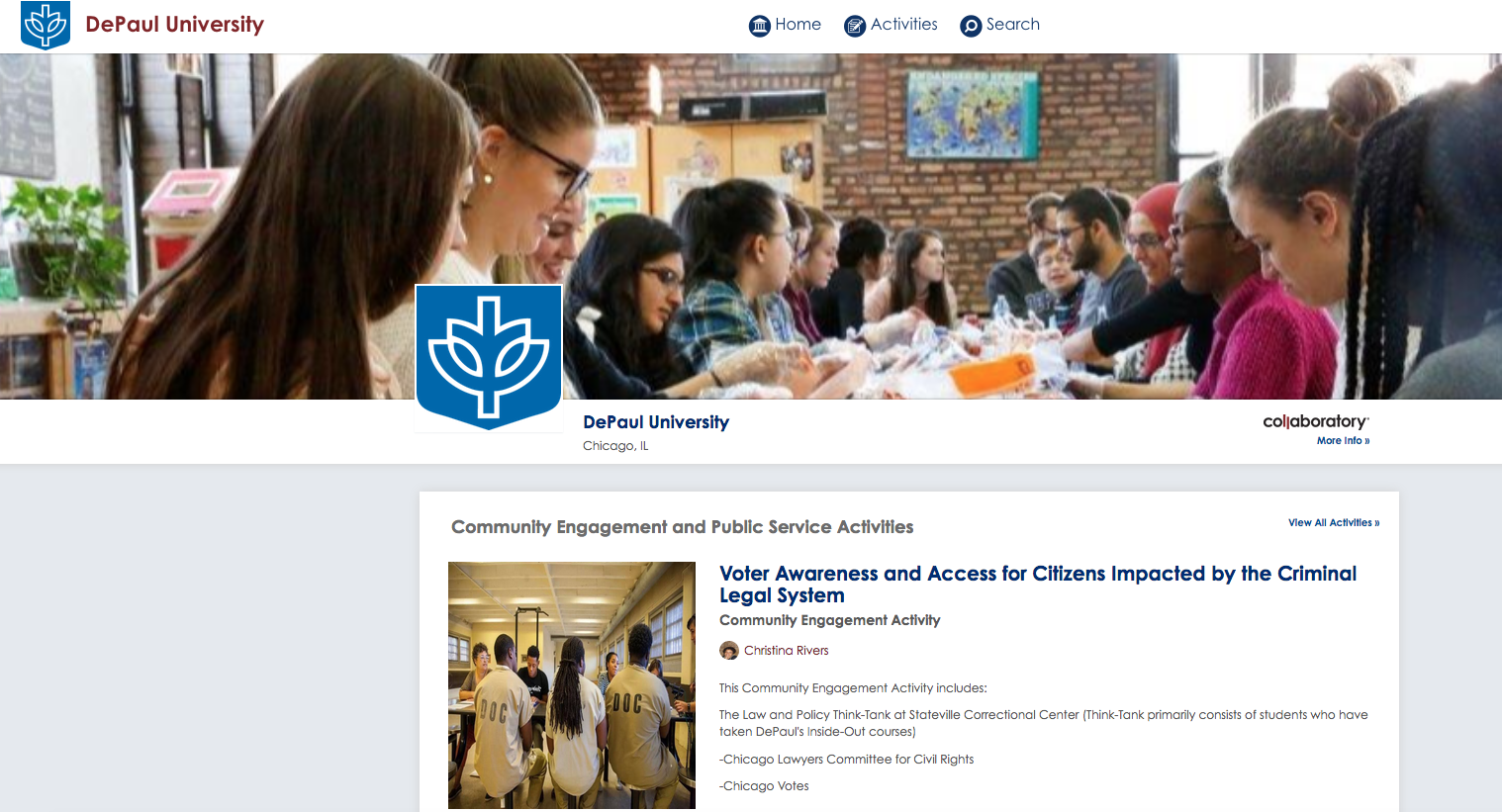
A primary challenge of community-engaged institutions like DePaul is documenting and telling their stories. This challenge is the focus of Barbara Smith, Steans Center Associate Director for Compliance and
Partnership Management. Smith administers the
Collaboratory, a software-based project that DePaul, along with numerous universities across the country, employs
to track community engagement and public service
“We ask a series of questions and
collect data to be able to get a broad view of how DePaul is engaging and if we
are living our mission – which is about community engagement,” says Smith. Faculty, staff and community partners utilize Collaboratory to piece together engagement activities that bring DePaul's mission alive. One of the challenges related to COVID-19, Smith says, is
continuing to gather information.
We want to get your story and are available to connect with you
“Face-to-face contact is always good, but
Zoom is also becoming a very effective way to keep our work in Collaboratory
moving forward with faculty and staff. We’ve found that once people are familiar with
the Collaboratory, they get more comfortable with it.” Sometimes it’s also
about reaching out in a direct and personal way. Smith explains, “I tell faculty that ‘I see
you’re teaching a course and that we’re tracking our community engagement
activity.' We want to get your story and are available to connect with you.” Community engagement doesn’t stop because there’s a pandemic, she adds. "It’s
so valuable now to tell our stories, and that’s what this is about.”
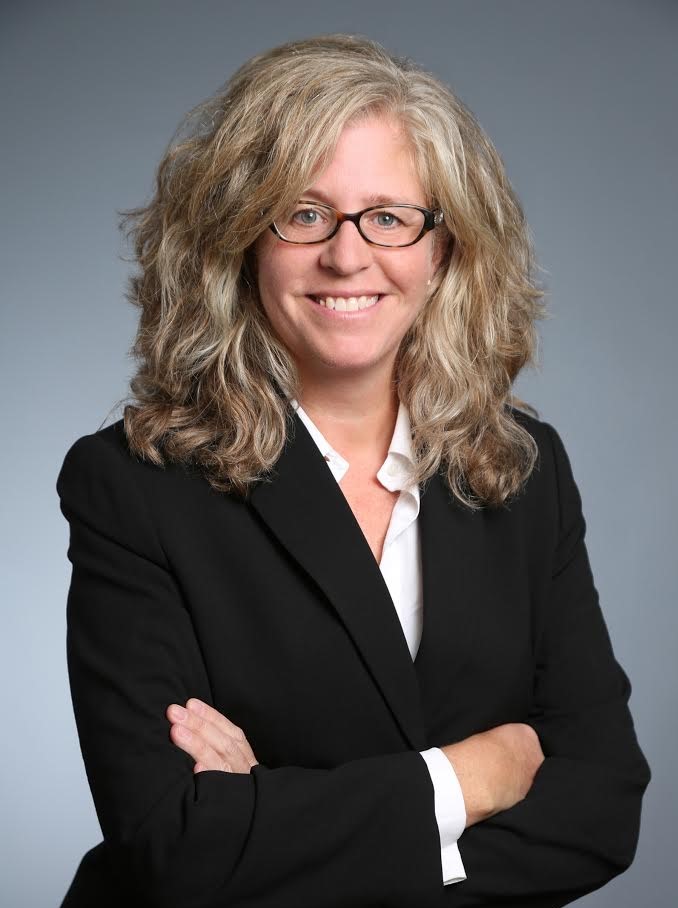 Linda Bendixen
Linda BendixenLinda Bendixen, the Steans
Center's Department Assistant who supports a range of operational and financial
responsibilities, is also behind-the-scenes working to support Collaboratory. Bendixen ('95), who earned her MBA at DePaul, started at the Steans Center in January. She recalls that
when the Center first responded to the pandemic, “I never heard a
question about ‘if’ – just a question of
'how’ the Center would respond.” Rosing notes that Bendixen plays a critical role by keeping staff connected to the rest of the university. Furthermore, he notes, "we have seen how untapped talents and skills of staff like Bendixen, who has a rich career in communications, have proved incredibly important in a remote working context."
Innovative Community Engagement through an Assets Framework
Tapping skills and talents of individuals in communities is at the core of the Steans Center's engagement approach, developed through partnership with the nonprofit Asset-based Community Development (ABCD) Institute. Housed within the Center since 2016, the ABCD Institute replaced
in-person trainings with remote trainings during the Spring which brought people together from across the country.
“We have found that technology is good enough so we can do
so much more than we could have done a year ago,” says Kim Hopes, Assistant
Director for ABCD Partnerships at the Steans Center. “For one training, the first day people
weren’t talking all that much – maybe they felt funny about it. But the second
day people spoke up right away and offered stories about their work.” It
helped, Hope adds, to add virtual breakout rooms to training – and have a trainer
go from “room to room” to facilitate conversations and keep them on topic.
In
addition, the ABCD Institute introduced a newsletter that shares responses
to the pandemic. The publication features news and stories that reflect on an
asset-based approach to community development in the U.S. and across the world. Capping off the Spring , along with the Steans Center, the Institute collaborated with groups across the world to co-host a 48-hour (un)conference, Co-Creating our Future Stories of Hope and Action: A "Glocal" Assets and Strengths-based (Un)Conference, including 39 contiguous sessions across 22 countries.
"The tools of ABCD directly contributed to the innovative ways staff responded to COVID-19 during Spring 2020," Rosing confirms. The Stean Center, Egan Office and the ABCD Institute took action by identifying untapped internal and external assets to craft experiences for students and teaching opportunities for faculty that in turn benefited communities. These reciprocal and creative forms of community engagement started with the question"how can the Center respond?," to paraphrase Bendixen, and are thus a direct response to a deeper DePaul question: "What must be Done?"